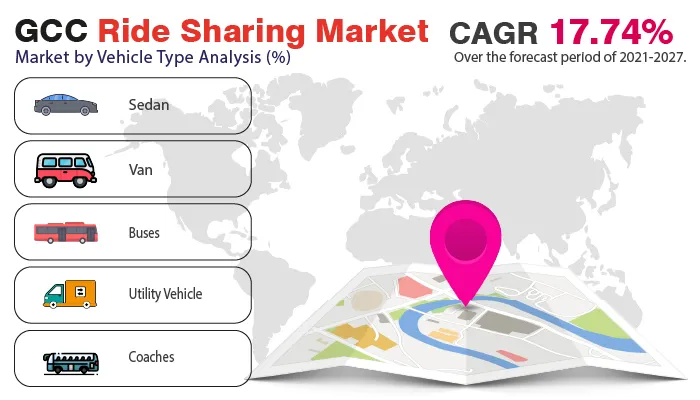GCC Ridesharing Market (Commuting Distance - Intercity; Vehicle Type - Sedan, Van, Buses, Utility Vehicle, and Coaches; Service Provider - OEM, and OEM and Private; Business Model - Business to Business, and Business to Consumer): Industry Analysis, Trends, Size, Share and Forecasts to 2027
A recent report published by Infinium Global Research on ridesharing market provides in-depth analysis of segments and sub-segments in the GCC as well as regional ridesharing market. The study also highlights the impact of drivers, restraints, and macro indicators on the GCC and regional ridesharing market over the short term as well as long term. The report is a comprehensive presentation of trends, forecast and dollar values of GCC ridesharing market. According to the report, the GCC ridesharing market is projected to grow at a CAGR of 17.74% over the forecast period of 2021-2027.

Market Insight
GCC Ridesharing market was valued at USD 24.27 billion in 2020 and is expected to reach USD 75.23 billion in 2027, with a CAGR of 17.74% during the forecast period. Digital ride-sharing platforms such as Uber, Ola, and Careem in the GCC countries belong to a wider framework of substitutive market innovation that is referred to as the sharing economy. Ride-sharing platforms serve as a medium to connect drivers who generally use their personal vehicles with passengers in need of a vehicle at an agreed price. Today's availability of smartphone apps makes it easy to participate in ride-sharing. These smartphone apps provide on-demand mobility solutions so its partners can offer shared ride service that pools riders heading in the same direction into the same car or van.
Recently, ride-sharing services have become popular in urban transport in GCC countries. In particular, the rise of dynamic ride-sharing startups has challenged the traditional taxicab services that drive market growth. Furthermore, an increase in the cost of vehicle ownership in GCC countries is expected to drive market growth. The ownership of a vehicle is cumulative of multiple factors such as finance, fuel, maintenance, registration/taxes, and maintenance & repair, along with depreciation. Current economies in the GCC region, in particular, are radically changing, caused by the development of sustainability policies, the rise of new technologies, and changing consumer preferences around ownership. In Saudi Arabia, the kingdom has invested in rideshare apps for many reasons. Besides helping women enter the workforce, the government is trying to handle falling oil prices. The government is pushing more local people away from government jobs and towards the private sector. However, unpredictable transport policies of different countries and resistance from traditional transport services hamper the market growth. Ridesharing and carpooling are highly regulated in the UAE and are possible only if certain principles set by governing bodies such as the Roads and Transport Authority (RTA) Dubai and the Department of Transport in Abu Dhabi are met. Ridesharing services have gained popularity in GCC countries in recent years owing to attributes such as reduced travel costs, traffic congestion, and emissions. However, the ridesharing market has lost its fair share of an uprising as a transportation mode with the impact of COVID-19. As the COVID-19 lockdown and curfew policies dramatically restrict mobility in GCC cities, the urban transport landscape is undergoing considerable disruption. For transportation decision-makers, the crisis poses a difficult challenge.
Geographically, Saudi Arabia dominates the GCC ridesharing market. In Saudi Arabia, more and more women receive their driving licenses, therefore increasing their participation in the workforce through access to affordable transportation such as ride-sharing, in addition to increasing women’s access to flexible, part-time economic opportunities. After witnessing a huge potential in the ridesharing business in countries such as Saudi Arabia, UAE, and Oman, various players are looking for creating the best ridesharing solution for their startups. The ease of booking and enhanced passenger comfort is also the key reasons for market growth in these countries.
Segment Covered
The report on GCC ridesharing market covers segments such as commuting distance, vehicle type, service provider, and business model. On the basis of commuting distance, the sub-markets include intercity. On the basis of vehicle type, the sub-markets include sedan, van, buses, utility vehicle, and coaches. On the basis of service provider, the sub-markets include OEM, and OEM and private. On the basis of business model, the sub-markets include business to business, and business to consumer.
Companies Profiled:
The report provides profiles of the companies in the market such as Uber, Talixo, Taxis, Bolt, Limos, Didi, and Ola.
Report Highlights:
The report provides deep insights into the demand forecasts, market trends, and micro and macro indicators. In addition, this report provides insights into the factors that are driving and restraining the growth in this market. Moreover, The IGR-Growth Matrix analysis given in the report brings an insight into the investment areas that existing or new market players can consider. The report provides insights into the market using analytical tools such as Porter's five forces analysis and DRO analysis of ridesharing market. Moreover, the study highlights current market trends and provides forecast from 2021-2027. We also have highlighted future trends in the market that will affect the demand during the forecast period. Moreover, the competitive analysis given in each regional market brings an insight into the market share of the leading players.
